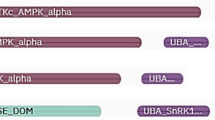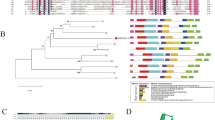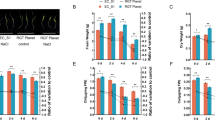Abstract
Main conclusion
Based on phenotypic, physiological and proteomic analysis, the possible mechanism by which Ds-26-16 regulates salt tolerance in Arabidopsis seedlings was revealed.
Abstract
Functional and mechanistic characterization of salt tolerance genes isolated from natural resources is crucial for their application. In this study, we report the possible mechanism by which Ds-26-16, a gene from Dunaliella, and its point mutation gene EP-5, enhance salt tolerance in Arabidopsis seedlings. Both Ds-26-16 and EP-5 transgenic lines displayed higher seed germination rates, cotyledon-greening rates, soluble sugar contents, decreased relative conductivity and ROS accumulation when germinating under 150 mM NaCl conditions. Comparative proteomic analysis revealed that there were 470 or 391 differentially expressed proteins (DEPs) in Ds-26-16 or EP-5, respectively, compared with the control (3301) under salt stress. The GO and KEGG enrichment analyses showed the DEPs in Ds-26-16 vs. 3301 and EP-5 vs. 3301 were similar and mainly enriched in photosynthesis, regulation of gene expression, carbohydrate metabolism, redox homeostasis, hormonal signal and defense, and regulation of seed germination. Thirty-seven proteins were found to be stably expressed under salt stress due to the expression of Ds-26-16, and eleven of them contain the CCACGT motif which could be bound by the transcription factor in ABA signaling to repress gene transcription. Taken together, we propose that Ds-26-16, as a global regulator, improves salt-tolerance by coordinating stress-induced signal transduction and modulating multiple responses in Arabidopsis seedlings. These results provide valuable information for utilizing natural resources in crop improvement for breeding salt-tolerant crops.








Similar content being viewed by others
Data availability
The mass spectrometry proteomics data have been deposited to the ProteomeXchange Consortium (http://proteomecentral.proteomexchange.org) via the iProX partner repository (Ma et al. 2019) with the dataset identifier PXD031133. Other datasets and plant materials generated during the study are available from the corresponding author upon request.
Abbreviations
- ACO2:
-
1-aminocyclopropane-1-carboxylate oxidase
- BP:
-
Biological process
- CAS:
-
Calcium sensing receptor
- DEP:
-
Differentially expressed protein
- MLP:
-
Major latex protein
- MS:
-
Murashige and Skoog
- RC:
-
Relative conductivity
- TF:
-
Transcription factor
References
Alsheikh MK, Heyen BJ, Randall SK (2003) Ion binding properties of the dehydrin ERD14 are dependent upon phosphorylation. J Biol Chem 278(42):40882–40889. https://doi.org/10.1074/jbc.M307151200
Che Y, Fu A, Hou X, McDonald K, Buchanan BB, Huang W, Luan S (2013) C-terminal processing of reaction center protein D1 is essential for the function and assembly of photosystem II in Arabidopsis. Proc Natl Acad Sci USA 110(40):16247–16252. https://doi.org/10.1073/pnas.1313894110
Chen JY, Dai XF (2010) Cloning and characterization of the Gossypium hirsutum major latex protein gene and functional analysis in Arabidopsis thaliana. Planta 231(4):861–873. https://doi.org/10.1007/s00425-009-1092-2
Dong Z, Yu Y, Li S, Wang J, Tang S, Huang R (2016) Abscisic acid antagonizes ethylene production through the ABI4-mediated transcriptional repression of ACS4 and ACS8 in Arabidopsis. Mol Plant 9(1):126–135. https://doi.org/10.1016/j.molp.2015.09.007
Dou H, Xv K, Meng Q, Li G, Yang X (2015) Potato plants ectopically expressing Arabidopsis thaliana CBF3 exhibit enhanced tolerance to high-temperature stress. Plant Cell Environ 38(1):61–72. https://doi.org/10.1111/pce.12366
Fillinger S, Boschi-Muller S, Azza S, Dervyn E, Branlant G, Aymerich S (2000) Two glyceraldehyde-3-phosphate dehydrogenases with opposite physiological roles in a nonphotosynthetic bacterium. J Biol Chem 275(19):14031–14037. https://doi.org/10.1074/jbc.275.19.14031
Flowers TJ, Munns R, Colmer TD (2015) Sodium chloride toxicity and the cellular basis of salt tolerance in halophytes. Ann Bot 3:419–431. https://doi.org/10.1093/aob/mcu217
Fujita K, Inui H (2021) Review: biological functions of major latex-like proteins in plants. Plant Sci 306:110856. https://doi.org/10.1016/j.plantsci.2021.110856
Gong WF, Zhao LN, Hu B, Chen XW, Zhang F, Zhu ZM, Chen DF (2014) Identifying novel salt-tolerant genes from Dunaliella salina using a Haematococcus pluvialis expression system. Plant Cell Tiss Org Cult 117(1):113–124. https://doi.org/10.1007/s11240-014-0425-4
Guo H, Feng P, Chi W, Sun X, Xu X, Li Y, Ren D, Lu C, David Rochaix J, Leister D, Zhang L (2016) Plastid-nucleus communication involves calcium-modulated MAPK signalling. Nat Commun 7:12173. https://doi.org/10.1038/ncomms12173
Guo Y, Dong Y, Hong X, Pang X, Chen D, Chen X (2016) Directed evolution of Dunaliella salina Ds-26-16 and salt-tolerant response in Escherichia coli. Int J Mol Sci 17(11):1813. https://doi.org/10.3390/ijms17111813
Hepler PK (2005) Calcium: a central regulator of plant growth and development. Plant Cell 17(8):2142–2155. https://doi.org/10.1105/tpc.105.032508
Hoang XLT, Prerostova S, Thu NBA, Thao NP, Vankova R, Tran LP (2021) Histidine kinases: diverse functions in plant development and responses to environmental conditions. Annu Rev Plant Biol 72:297–323. https://doi.org/10.1146/annurev-arplant-080720-093057
Huang SS, Chen J, Dong XJ, Patton J, Pei ZM, Zheng HL (2011) Calcium and calcium receptor CAS promote Arabidopsis thaliana de-etiolation. Physiol Plant 144(1):73–82. https://doi.org/10.1111/j.1399-3054.2011.01523.x
Ji H, Pardo JM, Batelli G, Van Oosten MJ, Bressan RA, Li X (2013) The salt overly sensitive (SOS) pathway: established and emerging roles. Mol Plant 6(2):275–286. https://doi.org/10.1093/mp/sst017
Jin H, Liu B, Luo L, Feng D, Wang P, Liu J, Da Q, He Y, Qi K, Wang J, Wang HB (2014) Hypersensitive to high light1 interacts with low quantum yield of photosystem II1 and functions in protection of photosystem II from photodamage in Arabidopsis. Plant Cell 26(3):1213–1229. https://doi.org/10.1105/tpc.113.122424
Kiegle E, Moore CA, Haseloff J, Tester MA, Knight MR (2000) Cell-type-specific calcium responses to drought, salt and cold in the Arabidopsis root. Plant J 23(2):267–278. https://doi.org/10.1046/j.1365-313x.2000.00786.x
Koussevitzky S, Nott A, Mockler TC, Hong F, Sachetto-Martins G, Surpin M, Lim J, Mittler R, Chory J (2007) Signals from chloroplasts converge to regulate nuclear gene expression. Science 316(5825):715–719. https://doi.org/10.1126/science.1140516
Kovacs D, Kalmar E, Torok Z, Tompa P (2008) Chaperone activity of ERD10 and ERD14, two disordered stress-related plant proteins. Plant Physiol 147(1):381–390. https://doi.org/10.1104/pp.108.118208
Li B, Hou L, Song C, Wang Z, Xue Q, Li Y, Qin J, Cao N, Jia C, Zhang Y, Shi W (2022) Biological function of calcium-sensing receptor (CAS) and its coupling calcium signaling in plants. Plant Physiol Biochem 180:74–80. https://doi.org/10.1016/j.plaphy.2022.03.032
Linkies A, Müller K, Morris K, Turecková V, Wenk M, Cadman CS, Corbineau F, Strnad M, Lynn JR, Finch-Savage WE, Leubner-Metzger G (2009) Ethylene interacts with abscisic acid to regulate endosperm rupture during germination: a comparative approach using Lepidium sativum and Arabidopsis thaliana. Plant Cell 21(12):3803–3822. https://doi.org/10.1105/tpc.109.070201
Liu J, Last RL (2017) A chloroplast thylakoid lumen protein is required for proper photosynthetic acclimation of plants under fluctuating light environments. Proc Natl Acad Sci USA 114(38):E8110–E8117. https://doi.org/10.1073/pnas.1712206114
Luber CA, Cox J, Lauterbach H, Fancke B, Selbach M, Tschopp J, Akira S, Wiegand M, Hochrein H, O’Keeffe M, Mann M (2010) Quantitative proteomics reveals subset-specific viral recognition in dendritic cells. Immunity 32(2):279–289. https://doi.org/10.1016/j.immuni.2010.01.013
Luo X, Dai Y, Zheng C, Yang Y, Chen W, Wang Q, Chandrasekaran U, Du J, Liu W, Shu K (2021) The ABI4-RbohD/VTC2 regulatory module promotes reactive oxygen species (ROS) accumulation to decrease seed germination under salinity stress. New Phytol 229(2):950–962. https://doi.org/10.1111/nph.16921
Ma J, Chen T, Wu SF, Yang CY, Bai MZ, Shu KX, Li KL, Zhang GQ, Jin Z, He FC, Hermjakob H, Zhu YP (2019) iProX: an integrated proteome resource. Nucleic Acids Res 47(D1):D1211–D1217. https://doi.org/10.1093/nar/gky869
Morton MJL, Awlia M, Al-Tamimi N, Saade S, Pailles Y, Negrão S, Tester M (2019) Salt stress under the scalpel-dissecting the genetics of salt tolerance. Plant J 97(1):148–163. https://doi.org/10.1111/tpj.14189
Munns R, James RA, Läuchli A (2006) Approaches to increasing the salt tolerance of wheat and other cereals. J Exp Bot 57(5):1025–1043. https://doi.org/10.1093/jxb/erj100
Mustroph A, Sonnewald U, Biemelt S (2007) Characterisation of the ATP-dependent phosphofructokinase gene family from Arabidopsis thaliana. FEBS Lett 581(13):2401–2410. https://doi.org/10.1016/j.febslet.2007.04.060
Nomura H, Komori T, Uemura S, Kanda Y, Shimotani K, Nakai K, Furuichi T, Takebayashi K, Sugimoto T, Sano S, Suwastika IN, Fukusaki E, Yoshioka H, Nakahira Y, Shiina T (2012) Chloroplast-mediated activation of plant immune signalling in Arabidopsis. Nat Commun 3:926. https://doi.org/10.1038/ncomms1926
Pang Q, Chen S, Dai S, Chen Y, Wang Y, Yan X (2010) Comparative proteomics of salt tolerance in Arabidopsis thaliana and Thellungiella halophila. J Proteome Res 9(5):2584–2599. https://doi.org/10.1021/pr100034f
Park SY, Fung P, Nishimura N, Jensen DR, Fujii H, Zhao Y, Lumba S, Santiago J, Rodrigues A, Chow TF, Alfred SE, Bonetta D, Finkelstein R, Provart NJ, Desveaux D, Rodriguez PL, McCourt P, Zhu JK, Schroeder JI, Volkman BF, Cutler SR (2009) Abscisic acid inhibits type 2C protein phosphatases via the PYR/PYL family of START proteins. Science 324(5930):1068–1071. https://doi.org/10.1126/science.1173041
Parvin K, Hasanuzzaman M, Bhuyan MHMB, Mohsin SM, Fujita AM (2019) Quercetin mediated salt tolerance in tomato through the enhancement of plant antioxidant defense and glyoxalase systems. Plants (Basel) 8(8):247. https://doi.org/10.3390/plants8080247
Quintero FJ, Martinez-Atienza J, Villalta I, Jiang X, Kim WY, Ali Z, Fujii H, Mendoza I, Yun DJ, Zhu JK, Pardo JM (2011) Activation of the plasma membrane Na/H antiporter Salt-Overly-Sensitive 1 (SOS1) by phosphorylation of an auto-inhibitory C-terminal domain. Proc Natl Acad Sci USA 108(6):2611–2616. https://doi.org/10.1073/pnas.1018921108
Ravet K, Touraine B, Boucherez J, Briat JF, Gaymard F, Cellier F (2009) Ferritins control interaction between iron homeostasis and oxidative stress in Arabidopsis. Plant J 57(3):400–412. https://doi.org/10.1111/j.1365-313X.2008.03698.x
Sahrawy M, Avila C, Chueca A, Cánovas FM, López-Gorgé J (2004) Increased sucrose level and altered nitrogen metabolism in Arabidopsis thaliana transgenic plants expressing antisense chloroplastic fructose-1,6-bisphosphatase. J Exp Bot 55(408):2495–2503. https://doi.org/10.1093/jxb/erh257
Schulze S, Mant A, Kossmann J, Lloyd JR (2004) Identification of an Arabidopsis inorganic pyrophosphatase capable of being imported into chloroplasts. FEBS Lett 565(1–3):101–105. https://doi.org/10.1016/j.febslet.2004.03.080
Schwarte S, Bauwe H (2007) Identification of the photorespiratory 2-phosphoglycolate phosphatase, PGLP1, in Arabidopsis. Plant Physiol 144(3):1580–1586. https://doi.org/10.1104/pp.107.099192
Seo M, Aoki H, Koiwai H, Kamiya Y, Nambara E, Koshiba T (2004) Comparative studies on the Arabidopsis aldehyde oxidase (AAO) gene family revealed a major role of AAO3 in ABA biosynthesis in seeds. Plant Cell Physiol 45(11):1694–1703. https://doi.org/10.1093/pcp/pch198
Tang RH, Han S, Zheng H, Cook CW, Choi CS, Woerner TE, Jackson RB, Pei ZM (2007) Coupling diurnal cytosolic Ca2+ oscillations to the CAS-IP3 pathway in Arabidopsis. Science 315(5817):1423–1426. https://doi.org/10.1126/science.1134457
Terashima M, Petroutsos D, Hüdig M, Tolstygina I, Trompelt K, Gäbelein P, Fufezan C, Kudla J, Weinl S, Finazzi G, Hippler M (2012) Calcium-dependent regulation of cyclic photosynthetic electron transfer by a CAS, ANR1, and PGRL1 complex. Proc Natl Acad Sci USA 109(43):17717–17722. https://doi.org/10.1073/pnas.1207118109
van Zelm E, Zhang Y, Testerink C (2020) Salt tolerance mechanisms of plants. Annu Rev Plant Biol 71:403–433. https://doi.org/10.1146/annurev-arplant-050718-100005
Wang WH, Chen J, Liu TW, Chen J, Han AD, Simon M, Dong XJ, He JX, Zheng HL (2014) Regulation of the calcium-sensing receptor in both stomatal movement and photosynthetic electron transport is crucial for water use efficiency and drought tolerance in Arabidopsis. J Exp Bot 65(1):223–234. https://doi.org/10.1093/jxb/ert362
Wang Y, Hu B, Du S, Gao S, Chen X, Chen D (2016) Proteomic analyses reveal the mechanism of Dunaliella salina Ds-26-16 gene enhancing salt tolerance in Escherichia coli. PLoS One 11(5):e0153640. https://doi.org/10.1371/journal.pone.0153640
Wang CF, Han GL, Yang ZR, Li YX, Wang BS (2022) Plant salinity sensors: current understanding and future directions. Front Plant Sci 13:859224. https://doi.org/10.3389/fpls.2022.859224
Wind JJ, Peviani A, Snel B, Hanson J, Smeekens SC (2013) ABI4: versatile activator and repressor. Trends Plant Sci 18(3):125–132. https://doi.org/10.1016/j.tplants.2012.10.004
Yamauchi Y, Hasegawa A, Mizutani M, Sugimoto Y (2012) Chloroplastic NADPH-dependent alkenal/one oxidoreductase contributes to the detoxification of reactive carbonyls produced under oxidative stress. FEBS Lett 586(8):1208–1213. https://doi.org/10.1016/j.febslet.2012.03.013
Yan SP, Zhang QY, Tang ZC, Su WA, Sun WN (2006) Comparative proteomic analysis provides new insights into chilling stress responses in rice. Mol Cell Proteomics 5(3):484–496. https://doi.org/10.1074/mcp.M500251-MCP200
Yooyongwech S, Samphumphuang T, Tisarum R, Theerawitaya C, Cha-Um S (2016) Arbuscular mycorrhizal fungi (AMF) improved water deficit tolerance in two different sweet potato genotypes involves osmotic adjustments via soluble sugar and free proline. Sci Hortic 198:107–117. https://doi.org/10.1016/j.scienta.2015.11.002
Yu J, Niu L, Yu J, Liao W, Xie J, Lv J, Feng Z, Hu L, Dawuda MM (2019) The involvement of ethylene in calcium-induced adventitious root formation in cucumber under salt stress. Int J Mol Sci 20(5):1047. https://doi.org/10.3390/ijms20051047
Zhang X, Henriques R, Lin SS, Niu QW, Chua NH (2006) Agrobacterium-mediated transformation of Arabidopsis thaliana using the floral dip method. Nat Protoc 1(2):641–646. https://doi.org/10.1038/nprot.2006.97
Zhang S, Heyes DJ, Feng L, Sun W, Johannissen LO, Liu H, Levy CW, Li X, Yang J, Yu X, Lin M, Hardman SJO, Hoeven R, Sakuma M, Hay S, Leys D, Rao Z, Zhou A, Cheng Q, Scrutton NS (2019) Structural basis for enzymatic photocatalysis in chlorophyll biosynthesis. Nature 574(7780):722–725. https://doi.org/10.1038/s41586-019-1685-2
Zhao X, Xu M, Wei R, Liu Y (2015) Expression of OsCAS (Calcium-Sensing Receptor) in an Arabidopsis mutant increases drought tolerance. PLoS One 10(6):e0131272. https://doi.org/10.1371/journal.pone.0131272
Zhao C, Zhang H, Song C, Zhu JK, Shabala S (2020) Mechanisms of plant responses and adaptation to soil salinity. Innovation (NY) 1(1):100017. https://doi.org/10.1016/j.xinn.2020.100017
Zimmerman SA, Ferry JG (2008) The beta and gamma classes of carbonic anhydrase. Curr Pharm Des 14(7):716–721. https://doi.org/10.2174/138161208783877929
Acknowledgements
This work was supported by Grants from the National Natural Science Foundation of China (No. 32070349), the Fundamental Research Funds for the Central Universities, Nankai University (No. 60), and the Natural Science Foundation of Tianjin (No. 21JCYBJC00010).
Author information
Authors and Affiliations
Corresponding authors
Ethics declarations
Conflict of interest
The authors declare that they have no conflicts of interest. All authors agree with the authorship and submission of the manuscript for peer review.
Additional information
Communicated by Dorothea Bartels.
Publisher's Note
Springer Nature remains neutral with regard to jurisdictional claims in published maps and institutional affiliations.
Supplementary Information
Below is the link to the electronic supplementary material.
Rights and permissions
Springer Nature or its licensor (e.g. a society or other partner) holds exclusive rights to this article under a publishing agreement with the author(s) or other rightsholder(s); author self-archiving of the accepted manuscript version of this article is solely governed by the terms of such publishing agreement and applicable law.
About this article
Cite this article
Liu, SY., Xie, JG., Chen, XW. et al. Dunaliella Ds-26-16 acts as a global regulator to enhance salt tolerance by coordinating multiple responses in Arabidopsis seedlings. Planta 257, 110 (2023). https://doi.org/10.1007/s00425-023-04149-5
Received:
Accepted:
Published:
DOI: https://doi.org/10.1007/s00425-023-04149-5




